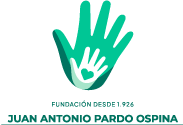About the Foundation
We guide processes for the continuous development of the different components of the PAI, by executing it throughout the year, involving users through the use of various diagnostic, intervention, and evaluation strategies for each component.

Our mission is to bring education, growth, integration and participation of society, companies and people to focus efforts on the development of the most vulnerable.
Goals
- Promoting the development of Occupational Skills: Acquiring skills that enable young people and adults to achieve labor, productive, and social inclusion, so they can pursue their life goals.
- Enhancing the development of Adaptive Skills: Acquiring and reinforcing basic skills for those who face difficulties in performing daily life activities.
- Providing guidance and support to families to help them overcome various challenges they encounter.
General objective
The primary objective of the Juan Antonio Pardo Ospina Foundation is to protect, educate, promote, work and act permanently as guarantors of compliance with the rights and care of children and young people with visual, cognitive, and intellectual disabilities. multi-disability, inspired by Christian principles, and in accordance with this objective, will develop activities related to the comprehensive, preventive and special protection of Boys, Girls, Adolescents and in general population groups that are in a situation of violation of their fundamental rights, in co-responsibility with the State and the different organizations of society; seeking the guarantee and compliance of Constitutional and Legal Rights within the framework of comprehensive protection, taking into account their Superior Interest and according to the regulations of the Colombian Social State of Law and quality standards, within the framework of equality and human dignity without any discrimination.
Our vision
The Foundation is projected for the year 2030, as an innovative entity in the development of educational methodologies, which takes into account technological advances and promotes the well-being of the population with visual, intellectual and multiple disabilities, supporting public policies, to contribute to the improvement and quality of life of each of the children and young people, inspired by Christian principles.
- Respect: Recognize the other as a valuable, worthy and different human being
- Honesty: Act consistently with truth and justice, demonstrating sincerity and loyalty in all actions.
- Humility: Recognize the physical, intellectual and emotional capabilities of others
- Solidarity: Helping others in difficult circumstances
- Transparency: Act in a clear, open and timely manner, generating trust in what we do
- Spirituality: It is believing and respecting the existence of a Supreme Being
Our history
How did we start?
The Colombian Institute for the Blind, as our institute was initially called, was founded under the motto “You will look with the eyes of the soul and mind to overcome the darkness and find the light”, an ideal proposed by its creator, Professor Juan Antonio Pardo. Ospina. In 1926, “The Colombian Institute for the Blind” was founded by Mr. Juan Antonio Pardo Ospina, a member of a prominent family in Bogotá society. He began work in his home, a few months later he moved the Institute to the “Samper Room”. This year, Law 45 of 1926 was issued, which promotes education for the blind in Colombia, the author of this law being Mr. Juan Antonio Pardo Ospina. The institution is given a Board of Directors made up of the president of the Society of Saint Vincent de Paul, the secretary of the Ministry of Education and Public Health and a treasurer who will be appointed by this same Ministry. On March 1, 1927, the institution’s boarding school was organized in premises taken for lease and the boarding school, semi-boarding school and day school operated. Sections of literature, music and workshops are organized. Law 40 of 1927, drafted by Don Juan Antonio Pardo Ospina, is issued by Congress, a law that makes the Institute and its organization more stable.
Coexistence manual
The coexistence manual is an instrument developed jointly by the entire educational community; it describes rights and incentives, duties and procedures for those who benefit and the institution’s staff. In accordance with current laws such as the law on childhood and adolescence, in order to facilitate the educational process, healthy coexistence and the integral formation of the human being, promoting the formation of values.
Best friends
Promote healthy lifestyles in children, adolescents, and young people through daily practices, generating the acquisition of appropriate habits that guarantee their health and general well-being. Strengthen the basic and specific competencies and life skills of children, adolescents, and young people, contributing to the strengthening of the life project through the development of theoretical-practical activities. Promote the construction of scenarios for participation and peaceful coexistence of children, adolescents, and young people, through recognition as subjects of rights and healthy coexistence.




















